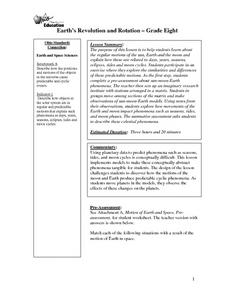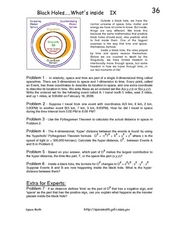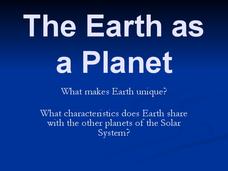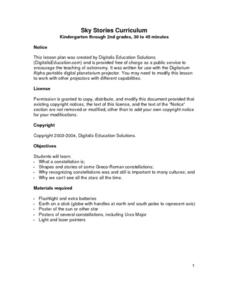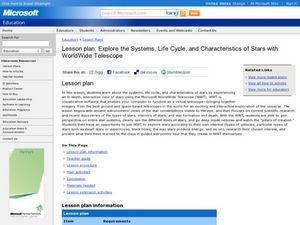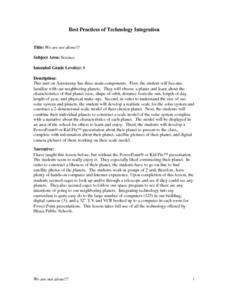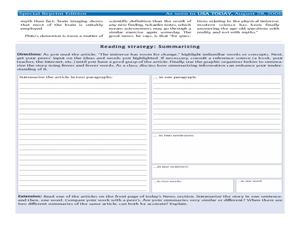Curated OER
Earth's Revolution and Rotation
Eighth graders investigate the regular motions of the sun, Earth and the moon and explain how these are related to days, years, seasons, eclipses, tides and moon cycles. They participate in an exercise where they explore the...
Curated OER
Charting The Planets
Young scholars conduct different activities in order to unlock the secrets of the universe. They answer different questions that are written to assess knowledge of the planets. Information can be found on the internet to help.
Curated OER
Solar System Bead Distance Activity
Middle schoolers create a scaled solar system model using colorful beads. In this space science instructional activity, students convert AU units into metric measurements. They arrange the planets according to their distances from the sun.
Curated OER
Why is There a Tidal Bulge Opposite the Moon?
Students simulate how the Moon causes ocean tides. In this earth science lesson, students calculate gravitational acceleration using a mathematical formula. They compare the force of attraction between the Earth, Moon and Sun system.
Curated OER
Black Holes... What's inside IX
In this space science worksheet, students solve 7 problems related to black hole space and time. They answer questions related to the spacetime dimension.
Curated OER
Aurora Borealis
Pupils read background information about the Aurora Borealis and complete a science experiment based on the lights. In this Aurora Borealis lesson, students read information about the formation and background of the Aurora Borealis....
Curated OER
Distance in Space
Sixth graders explore space science by measuring distances between planets. In this solar system lesson, 6th graders view a Bill Nye video and discover the conversion between the metric system and imperial measuring systems. Students...
Curated OER
Observations From the Past
Ninth graders explore direct and indirect evidence. In this astronomy activity, 9th graders investigate the contribution of early astronomers to their field. They create a model of the solar system.
Curated OER
Scale Model of the Solar System
Students explore the size of the planets. In this science instructional activity, students create a scale model of the solar system. Students determine a scaling factor and calculate the size of their planets. Students create a scale...
Curated OER
Types of Scientists
In this science worksheet, students match each type of scientist listed in the left-had column to its correct description found in the right-hand column. There are 34 different scientists to match on the sheet.
Curated OER
Astronomy Unit Word List
In this astronomy worksheet, 8th graders are given 29 vocabulary words from their textbook unit and are to define the terms using their book and class notes.
Glynn County School System
The Earth as a Planet
What does our planet have in common with other planets? What makes it unique? Find out in a PowerPoint presentation highlighting many earthly facts! The lesson describes Earth's atmosphere in detail and adds many other important facts...
Glynn County School System
Light, History, Gravity, Distance, Relativity, and Space-Time
Let the star's color be the guide! The color of a star indicates its temperature and its mass and distance affect the gravitational force. The lesson presentations address these concepts as well as how the theory of special relativity...
Curated OER
Sky Time: On the Astronomical Meaning of the Day, Year and Seasons
Learners simulate the movement of the Earth using their body motion. In this earth science instructional activity, students explain how this causes seasonal changes on Earth.
Curated OER
Sky Stories
Students are introduced to the branch of science known as astronomy. They discuss stars and constellations and then view the night sky using a portable digital planetarium projector. They identify a variety of constellations and...
Curated OER
Star Quest
Students review the concepts of the branch of science known as astronomy. They discuss stars and constellations and then view the night sky using a portable digital planetarium projector. They identify a variety of constellations using a...
Curated OER
SUNSPOTS SPOTTED
Students study sunspots and their motion, from data gathered, they determine the significance of the sunspot data. The data be used to calculate the rotational period of the sun. They draw conclusions as to the sunspot's impact on the...
Curated OER
Explore the Characteristics of Stars with Microsoft WorldWide Telescope
Students explore the characteristics of stars. In this space science activity, students use the Microsoft WorldWide Telescope program to identify the properties of stars and identify the stars in the galaxy.
Curated OER
Swinging on a Star
Students explore the issues that might arise if humans were to go on an interstellar space mission. They synthesize their understanding of interstellar travel by writing scenes from a science fiction novel that would depict such a mission.
Curated OER
Stars and Constellations
Ninth graders investigate how ancient cultures viewed their world in terms of astronomy. They read and discuss an informational handout, construct an astrolabe, and locate stars and constellations using star charts.
Curated OER
We Are Not Alone!!!
Eighth graders explore the area of astronomy. They explore Earth's neighboring planets. Students research a planet's characteristics. They develop a scale model of the solar system and a narrative about the planets.
Curated OER
Cool! Awesome! What is it?
Students work in small groups to brainstorm hypotheses about mysterious science photographs, read and interpret answers to the science photographs, cooperatively develop a set of clues for the images and develop their own science photo...
Curated OER
The Universe Has Room for Change
In this universe and change worksheet, learners read about the demotion of Pluto as one of the 9 planets as well as other changes in science. Students summarize their reading and identify unfamiliar words in the article. Learners...
Curated OER
A Moon with a View
Third graders explore the rotation of Earth and the moon. In this solar system lesson, 3rd graders participate in an Earth and moon simulation in which part of the class "becomes" the sun, while other children represent the moon by...
Other popular searches
- Astronomy and Space Science
- Space Science Astronomy
- Science Astronomy Stars
- Earth Science Astronomy
- Science Astronomy Graphing
- Life Science Astronomy
- "Astronomy and Space Science


